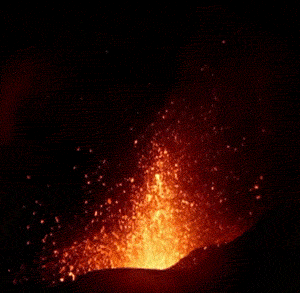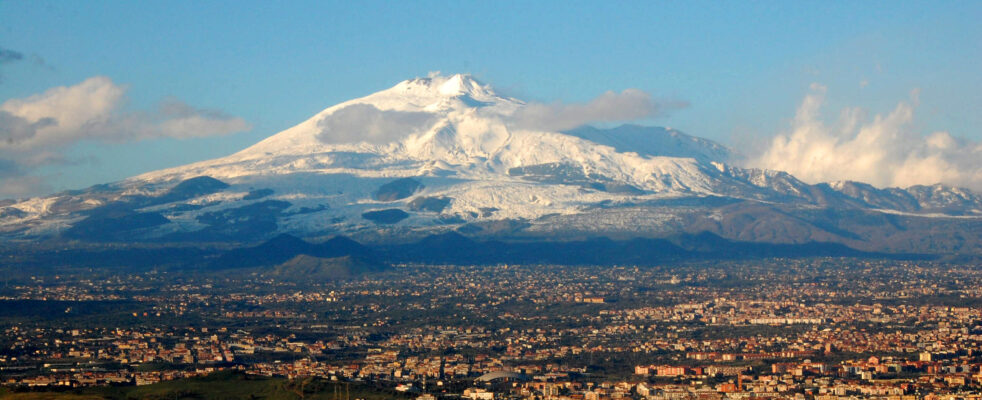
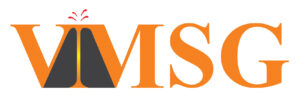
Hello volcanic and magmatic colleagues, and welcome to summer! This is the June 2023 VMSG Newsletter. Just as the lilac is blossoming and the hedgerows are growing full, this issue is overflowing with growth and bounty. We bring you news of an exciting exhibit, “Sensing Volcanoes”, at the Royal Society summer exhibition and its associated workshop, “Researchers Responding to Volcanic Crises” at the NHM. We unveil three exciting reports from VMSG student bursary winners, who have travelled to faraway lands to present their research. We bring news of a recently-published book on the extraordinary volcanic system of Mt. Merapi, Indonesia. Elsewhere, we share calls for applicants to various job openings, several VMSG prizes (final chance!), and to the MSc in Volcanology course at the University of Bristol. Isn’t it high time to sit in the sunshine and read this with a glass of lemonade? ¡Salud! – Ailsa Naismith
Dear VMSG community! We invite you to the workshop “Researchers Responding to Volcanic Crises: Uncertainty, Imagination, and Improving Best Practice for Collaboration”, held on Monday 3rd July 2023, 10am – 5pm at the John Flett Theatre of the Natural History Museum (NHM). The workshop will be run by Jenni Barclay, Martin Mahony and Teresa Armijos (UEA), David Pyle (University of Oxford) and Chiara Petrone (NHM) in association with the Royal Society Summer of Science “Sensing Volcanoes” exhibition (4th – 9th July 2023) (See the “Sensing Volcanoes exhibit” item below!). This workshop is sponsored by UKRI Hidden Histories, APEX Award and the VMSG.
What’s the deal?: Volcanic crises around the world present unprecedented opportunities to observe, measure, and understand the natural phenomena that created them, either via remote instrumental networks or by deployment of field teams and their instruments. The UK academic community has access to these opportunities because of rapid response funding from NERC Urgency Grants, and well-established access to remotely sensed datasets.
However, the exploitation of scientific opportunities can create tensions, and there is more to a volcanic crisis than at first meets the eye. They are adventures into the uncertain and unexpected for everyone involved. What helps us most in these moments of profound uncertainty, and how do the behaviours and responses of scientists influence events; and what influence do these events have on the scientists? Those who monitor these events may be left out of later scientific analysis, or their contributions may be insufficiently recognised. Often, observations made in the moment by lay observers are also critical to the understanding of the phenomena.
This workshop brings together a variety of people involved in understanding these practices for a day of learning, sharing and understanding. Two groups of volcanologists within the ongoing “Hidden Histories” AHRC/NERC collaboration, “Curating Crises” and “Decolonizing UK earth science pedagogy“, will share insights from their research. The workshop also includes two panel sessions that will explore the tensions that science in a crisis brings, how to shape best practice for the future using knowledge from the past, and making sense of volcanic eruptions during crisis. These sessions will involve experienced volcanologists, funders and sponsors of crisis science, and arts-based practitioners. A keynote talk from the award-winning UWI Seismic Research Centre Team will explore their own experiences of the 2020-2021 eruption of La Soufrière, St. Vincent.
Please come to learn and to share your own experiences! We particularly welcome early career researchers who would benefit from insights into obtaining or applying for this type of support, and interested researchers who respond to and learn from geophysical crises. After the event, the organising team will produce a short summary and recommendations for the VMSG community.
Please register for the workshop here.
NOTE: This workshop will be free of charge for VMSG members (but lunch is not included). We look forward to seeing you there! – The workshop organizers

Presenting at IAVCEI
Earlier this year, I had the opportunity to present results from analogue experiments I have been conducting at the IAVCEI Scientific Assembly. This was both my first time presenting more than a poster at a conference, and my first time attending a conference in person. I wasn’t quite sure what to expect, but it turns out that I needn’t have worried! I arrived in Rotorua a couple of days before the conference started to attend some of the pre-conference workshops. These were a great way to meet people before the conference began and meant I had some friendly faces to look out for on Day One. The first workshop I attended helped me to think about what I might want to do after my PhD. The workshop’s panel members were fantastic and from a range of backgrounds; it was so helpful to hear such a range of perspectives and available pathways. I also attended a workshop where I got some encouragement and advice on writing papers and navigating the publication process; this was another very valuable session. My presentation wasn’t until the final day of the conference, meaning I had plenty of time to prepare (and get anxious!). I presented my talk, “Lava dome morphology controlled by viscosity and cohesion: Insights from analogue modelling”, in the session “From shape to process: geomorphology as a tool to unravel volcanic processes”. The feedback from the audience was really positive, who especially liked the GIFs I generated from time-lapse photography during each experiment. Attending IAVCEI was a great experience; I came away feeling much more confident and ready to tackle the paper writing process. – Amy Myers

In front of Champagne Pool, Wai-O-Tapu Thermal Wonderland
I recently attended the EGU (European Geosciences Union) 2023 conference in Vienna and presented my work. This was largely made possible through VMSG funding.
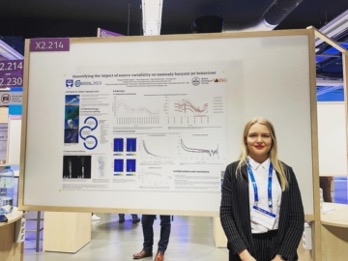
Presenting my research, “Quantifying the impact of source variability on unsteady buoyant jet behaviour” at EGU session: Advances in volcanic hazard monitoring and modelling.
I am in the final year of my PhD research. My project involves both numerical and physical modelling of volcanic plumes. This work is fundamental, particularly for volcanic ash concentration forecasts and subsequent aviation advisories.
Numerical models are used to predict ash concentration forecasts, and often rely on initialization by simpler one-dimensional models that predict the source term (i.e., mass erupted, plume height and grain size distribution) in real time. The problem is, these one-dimensional models often assume a continuous stream of material emerging from the vent (in other words, steady-state source conditions). In reality, source conditions fluctuate, particularly during Strombolian and Vulcanian-style eruptions. My project replicates a series of scaled buoyant jets exhibiting steady-state and unsteady source conditions in the laboratory. The behaviour of the buoyant jet is analysed in response to varying source conditions, and the results are compared to assumptions made in numerical models. I presented preliminary findings from this research at EGU.
My PhD commenced in 2019 and shortly after, COVID occurred. Due to this, I have not had many opportunities to present at conferences in person. Additionally, this was my first time attending an international conference and travelling alone! The experience was amazing, and I recommend it to any young researcher interested in pursuing a research career. It was an opportunity to communicate my work, receive feedback, and network with academics. Learning about the latest research in volcanology was truly inspiring, and I left Vienna with a sense of excitement, knowing that I am on the path to achieving a career in volcanology research. – Morgan Hetherington
During January and February 2023, I was fortunate enough to attend the IAVCEI Scientific Assembly 2023 in Rotorua, New Zealand thanks to the VMSG travel bursary.
The conference began with the creation of the hashtag #IAVCEIstranded following intense rainfall and flooding which resulted in the temporary closure of Auckland International Airport, temporarily stranding me in Melbourne, Australia. Luckily, the flight was rearranged for the next day, and I arrived in Rotorua the evening before the conference started.
This was my first in-person international conference, and so it was a great opportunity to present some of the work I have conducted during my PhD to a wider audience of international volcanologists. I presented numerical models on the coupling of magma fluid dynamics with thermal dynamics as a poster, and I presented observations of magma flow indicators of different scales (from the macroscale to the microscale) from the Whin Sill in northern England as an oral presentation in the “Architecture and dynamics of volcanic plumbing systems” session.
One of the highlights of the conference was the mid-conference fieldtrip to Taupō caldera, which included visits to incredible sequences of eruptive material from Taupō eruptions spanning thousands of years. The fieldtrip also included a boat tour on Lake Taupō, which was altered due to the poor weather but remained enlightening, taking us to visit the Maori Rock Carvings, and along the shoreline of the Taupō Caldera.
Overall, the conference was a great opportunity to network with researchers from different backgrounds and international institutions in a format that I have not yet had the opportunity to do during my PhD, and the discussions I had will greatly benefit my research going forwards. – Kate Williams
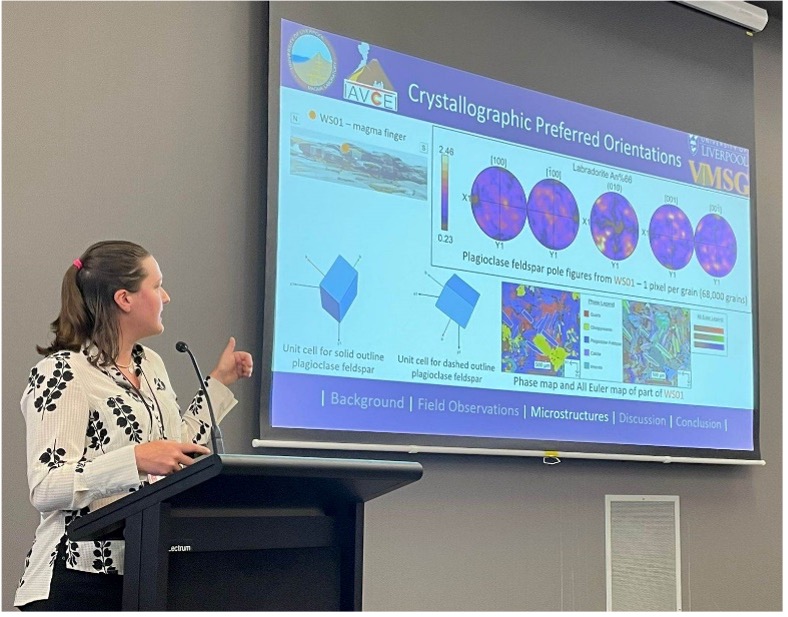
Using field observations and microstructural data to understand magma flow in mafic sills: A case study of the Whin Sill, Northern England
From the 4th – 9th July 2023 you can catch “Sensing Volcanoes” at the Royal Society Summer Science exhibition. “Sensing Volcanoes” is an interactive multi-sensory exploration of the ‘who, what and how’ of scientists’ and communities’ observations of volcanic phenomena over the last 150 years. The project is a collaboration between The University of East Anglia, The University of Oxford and the University of the West Indies Seismic Research Centre and is based on work undertaken as part of the Curating Crises project. The exhibit also showcases photographs, films, interviews, and paintings created by communities from St. Vincent and Montserrat.
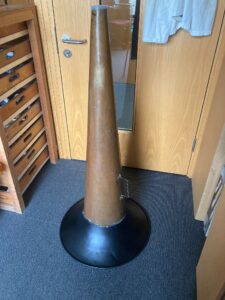
A restored version of Perret’s listening trumpet which contains a Bluetooth speaker that will play “sounds of the volcano” including rumbling earthquakes.
In the “SENSE” zone, visitors to the exhibit can explore the ways in which people observe changes in volcanic systems, making use of both their own senses (try the smelly volcano rocks!) and more sophisticated instrumentation. Using archive materials, the Sensing Volcanoes team have recreated some of the earliest volcano monitoring instruments, put to use by “expert sensors” like Frank Perret. Visitors can listen to the sounds of the volcano by putting their ear to a recreation of Perret’s listening trumpet into which “sounds of the volcano” are being played. They can also see how basic pendulums amplified volcanic tremor before modern seismometers were invented, and trace the evolution of instrumentation in our “DETECT” zone.
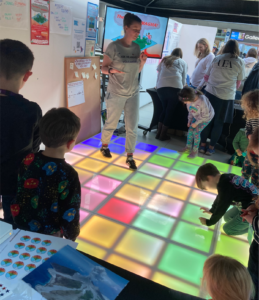
The Imaginarium in Game mode during its trial at the Norwich Science Festival. Players are deciding whether they should move away from the volcanic hazards.
In addition to early scientific instrumentation and observers, the exhibit highlights and celebrates the vital observations made by communities living on and around these volcanoes, many of whom were ignored, or whose knowledge was extracted but whose contributions were “hidden” from the official scientific record. In our “Curating Crises” zone, visitors can explore some historical stories from St. Vincent and Montserrat and see what lessons can be learned to improve future research and volcanic hazard response. Some of these lessons are already being embraced in the Changing Landscapes project on St. Vincent and in the Montserrat Murals project, where communities are reclaiming and exploring their relationship to the volcanic environment through films, community-collected data and cultural artworks.
A key feature of Sensing Volcanoes is the “Imaginarium”: an interactive sound and light floor installation which challenges people to imagine how they would respond to changing volcanic hazards in the light of uncertainty and risk. In “Game Mode”, players select a livelihood and consider the best place to live before a volcano is revealed. Players try to retain their “disaster dollars” by avoiding the volcanic hazards in the fewest moves and considering the push and pull factors that influence their choices. In “Display mode”, the Imaginarium transforms into a crustal section below La Soufrière St Vincent as it runs through the earthquakes and gas and magma migrations of the 2020-21 eruption. In doing so, we illustrate the sub-surface signals and processes that relate to felt signals at the surface.
We hope some of you will join us at the Royal Society for an exploration of Caribbean volcanoes and observers over the last 150 years …
The exhibition is free, and no booking is required. Opening times: July 4th: 6 – 10 pm (Lates event, adult only); July 5th, 6th: 10am – 4.30pm; July 7th, 8th, 9th: 10am – 6pm. We hope to see you there. – Bridie Verity-Davies

A reconstruction of the stratigraphy of the 2020-21 eruption of La Soufrière St Vincent using real rocks sampled in March 2023.
N.B.: Please also come to our associated workshop, “Researchers Responding to Volcanic Crises“, which will be held on Monday 3rd July at the NHM. See the associated item further up this newsletter for more details!
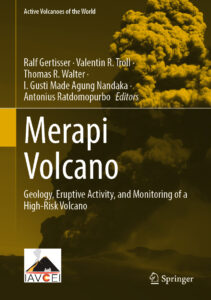
The latest addition to Springer’s Active Volcanoes of the World book series, “Merapi Volcano – Geology, Eruptive Activity, and Monitoring of a High-Risk Volcano”, provides the first comprehensive compilation of cutting-edge research on Merapi volcano on the island of Java, Indonesia. Towering almost 3,000 m above the dominantly agricultural lowlands surrounding Yogyakarta in Central Java, the volcano is best known for the frequent generation of pyroclastic density currents produced when Merapi’s viscous lava domes collapse under gravity or due to small explosions. This phenomenon – referred to as ‘Merapi-type’ nuées ardentes (glowing clouds) in the classic volcanological literature – has made Merapi a household name among researchers and students in volcanology and has lifted its status to one of the most iconic volcanoes on Earth. Merapi’s eruptions also pose a persistent threat to life, property, and infrastructure within the densely populated areas on the volcano’s flanks, as demonstrated most recently by the catastrophic eruption in 2010, which caused nearly 400 fatalities.
In a collection of 18 chapters authored by 67 scientists from Indonesia and abroad and edited by Ralf Gertisser (Keele University, UK), Valentin Troll (Uppsala University, Sweden), Thomas Walter (GFZ Potsdam, Germany), I Gusti Made Agung Nandaka (BPPTKG, Yogyakarta, Indonesia) and Antonius Ratdomopurbo (Geological Agency of Indonesia, Bandung, Indonesia), the book integrates in 572 pages the latest results from both the natural (geology, petrology, geochemistry, geophysics, physical volcanology) and social sciences, and provides state-of-the-art information on volcano monitoring, the assessment of volcanic hazards, and risk mitigation measures. An opening letter is provided by John Pallister and Jake Lowenstern of the United States Geological Survey, and the book’s foreword is given by Ibu Andiani, the Head of Indonesia’s Center for Volcanology and Geological Hazard Mitigation.
This comprehensive collection of the latest research at Merapi summarized in a single, 18-chapter book has been termed ‘monumental’ (Corado Cimarelli; book series editor) and ‘a must-read for any student of Merapi volcano’ (John Pallister).
Here is the link to the Springer website which hosts the digital version of the book. For enquiries, please contact: r.gertisser@keele.ac.uk – Ralf Gertisser, Valentin Troll, Thomas Walter, Made Nandaka, and Antonius Ratdomopurbo
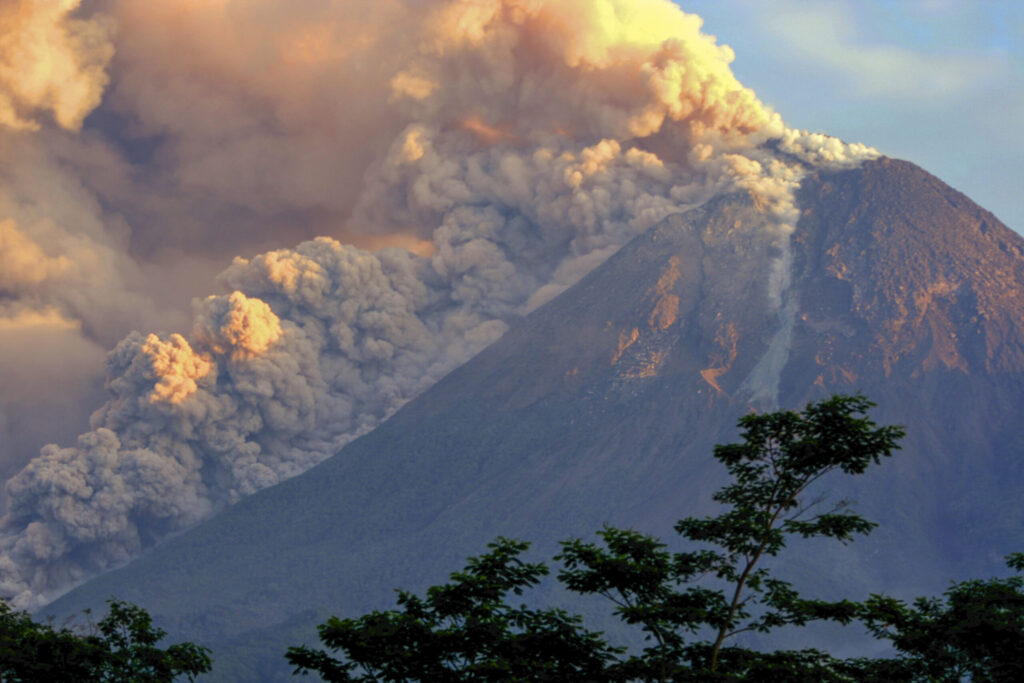
Dome-collapse PDCs generated in Merapi’s 27 May 2006 eruption. Image credit: BPPTKG-Geological Agency of Indonesia.
Hello undergraduate students with a potential interest in volcanology!
If you’ve ever wanted to learn more about physical volcanic processes, impacts of historical eruptions, or innovative research and monitoring methods at volcanoes around the world, then the MSc in Volcanology programme at the University of Bristol (UK) might be for you. (Please forward this to anyone you feel would be interested).
Taken over 1 year full-time (or 2 years part-time), this Masters programme is a combination of core and optional courses taught through lectures, practicals, peer-led discussion, and supervised independent research. Optional units include a two-week field trip to Central America. The programme finishes with a self-directed original research project and thesis. Skillsets developed within this programme include quantitative and computational skills, use of statistical and data handling software, critical analysis of scientific material from a variety of sources, and ability to synthesize concise and informative material. More details on course structure can be found here.
We are open to Home (UK), EU, and international students. There are opportunities for postgraduate student loans for UK students (and some EU students), and there are a number of scholarship and bursary schemes available for applicants, including international students: https://www.bristol.ac.uk/students/support/finances/scholarships/.
The MSc programme is taught by leading scientists in the Bristol Volcanology Group working at the cutting edge of research into volcanoes, and will provide you with a strong background for independent research to PhD level or for a career in industry, the public sector, or a non-governmental organisation. You can follow the research and teaching within our Volcanology Group through social media: https://twitter.com/UoBristolVolc.
We welcome and support a diverse background of applicants, and particularly encourage applications from demographic groups underrepresented in the geosciences and volcanology. The programme is open to those with degrees and backgrounds in earth science, geographical science, chemistry, physics, computer science, engineering and mathematics. More details on entry requirements, fees and funding, and applying, can be found on the course main page: https://www.bristol.ac.uk/study/postgraduate/2022/sci/msc-volcanology/
Expected application closure dates are 31st July 2023 for overseas applicants, and 4th August 2023 for Home (UK) applicants.
Want to learn more about life in Bristol? Find out more through the range of open days and sessions offered here. Any further questions can be directed to: choosebristol-pg@bristol.ac.uk . Thank you for your interest. – Bristol Volcanology Group

The 2022 – 23 MSc Volcanology cohort with colleagues from Guatemala, UK, and Spain on Volcán Acatenango (Guatemala)
One final reminder that there are currently three VMSG awards open and accepting applications until Tuesday, 6th June 2023.
Thermo-Fisher Award
The Thermo-Fisher VMSG Award is awarded annually to an individual who is deemed to have made a significant contribution to our current understanding of volcanic and magmatic processes. The awardee will be invited to deliver the a keynote lecture at the 2024 VMSG conference in Bristol.
Apply: https://vmsg.org.uk/awards/thermo-fischer-award/
Zeiss Postdoctoral Keynote Award
The Zeiss Postdoctoral Keynote Award is made annually to the lead author of an outstanding paper on a topic within the VMSG remit, who has also made an exceptional contribution to supporting individuals or the wider research community, or to broader society, commensurate with their early career stage. The Award winner will have the opportunity to present their research as a keynote talk at the 2024 VMSG conference in Bristol.
Apply: https://vmsg.org.uk/awards/post-doctoral-keynote-award/
Willy Aspinall Prize
The Willy Aspinall Prize is awarded annually to the lead author of an outstanding paper on applied volcanology or geoheritage published in English, who is within three years of their being awarded a PhD at a university in the UK. The award takes the form of a cash prize (£400) and a contribution towards attendance at an annual meeting of the Volcanic and Magmatic Studies Group (VMSG), where the winner will be invited to present their paper.
Apply: https://vmsg.org.uk/awards/willy-aspinall-award/
Please do consider nominating your colleagues, mentors and peers for these awards! – Emma Liu
The University of Edinburgh is seeking an experienced postdoctoral researcher in experimental rock physics to join the NERC-funded project, “On The Edge”, which aims to characterize the mechanical, microstructural, hydraulic, and seismic properties of rocks as they approach catastrophic failure. Ths successful candidate will have access to state-of-the-art X-ray transparent rock deformation equipment combined with seismic monitoring equipment, and will be involved in experiments at the Diamond National Synchrotron Facility. Closing date for applications is Wednesday, 7th June 2023.
Details for the job are available here.
The British Geological Survey (BGS) is seeking a candidate to fill a full-time position as a field geophysicist based at their headquarters in Keyworth, Nottingham. The successful candidate will join the BGS Multi-hazards & Resilience (MHR) challenge area which includes geohazard research, landslide characterisation and monitoring, geo-energy, infrastructure monitoring, groundwater-surface water interactions, permafrost, nuclear waste disposal, mine waste and contaminant transport problems. The successful candidate will support and extend the BGS’s existing activities in the field and in the laboratory, including operating and maintaining their international geophysical observatory network for monitoring landslides as well as installing new monitoring infrastructure to underpin MHR science and other BGS challenge areas. Closing date for applications is Sunday, 11th June 2023.
Details for the job are available here.
The University of Auckland seeks a full-time lecturer in Geographical Information Systems. This permanent position would suit a researcher and educator with strengths in geocomputation, urban analytics, spatial data science and/or spatial big data analytics. The successful candidate will join the University of Auckland’s School of Environment, home to a vibrant group of students, academics and professional staff pursuing diverse interests in the social and natural worlds. Closing date for applications is Tuesday, 13th June 2023.
Details for the job are available here.
Do you have any job opportunities, PhD Viva voce celebrations, or funding opportunities that you would like to advertise in this area? If so, please get in touch with ailsa.naismith@bristol.ac.uk .
Don’t forget to keep in touch with us and other volcanologists around the world. There are several ways you can do this: through the VMSG PhD and ECR directory (here), the Arizona State University mailing list (here), and the VMSG mailing list (here).
